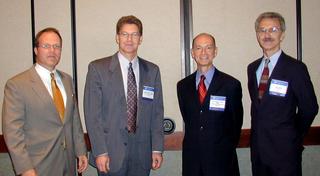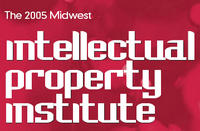Chief Judge Sams Outlines Current TTAB Initiatives
At the Midwest IP Institute yesterday, TTAB Chief Administrative Judge J. David Sams described several initiatives that the TTAB is currently pursuing in an effort to make TTAB inter partes practice more efficient and effective.

Judge Sams pointed out that two means are already available to parties who want to expedite inter partes proceedings: a telephone conference with an interlocutory attorney may be arranged to address troublesome issues that arise, and a standard protective agreement is available for adoption by the parties (and is sometimes imposed by the Board).
The Board is considering the following:
Mandatory initial disclosures: The TTAB opted out of the FRCP 26 requirement of discovery conferences and mandatory initial disclosures. An internal TTAB study group, however, has concluded that such a requirement could work at the TTAB, and the group provided detailed recommendations. The Trademark Public Advisory Committee has reviewed the issue and a plan has been put together. Judge Sams said that the TTAB bar will be hearing "a good deal more about it before too long."
Accelerated case resolution: Another internal study group has recommended a streamlined procedure for submitting evidence (in the nature of cross-motions for summary judgment) as an available alternative to a full trial on the merits. The Trademark Public Advisory Committee had a positive reaction and the TTAB will move forward with this item "in the near term."
Mandatory telephone conference before filing an unconsented motion: Implementation of this initiative doesn't seem to be as imminent as some of the other proposals.
TTAB decisions and orders by e-mail rather than paper: Part of the Board's apparent goal to eliminate paperwork.
Service by e-mail: Judge Sams noted that service by e-mail may already be happening "in a courtesy manner" The Board is working on making this an official method of service.
Service of opposition on applicant: Another proposal that the Board is considering is to have the opposer serve its notice of opposition (or petition for cancellation) directly on the applicant (registrant), rather than first filing it with the Board and waiting for the Board to send out the notice. The Board would simply send out a notice to the parties setting a due date for answer and a discovery/trial schedule. This, according to Judge Sams, is likely to be implemented "before too long."

Reviewing the TTAB from a statistical viewpoint, Judge Sams reported that this year the Board is meeting its goal of rendering a decision within 10 weeks after a case is ready for decision. The average this year has been 9.8 weeks. This contrasts sharply with the average in 1999: 41.5 weeks. As to contested motions, the average time for decision is "close" to the desired 10 weeks.
The total number of filings of oppositions, cancellations, and appeals for Fiscal Year 2005 (in excess of 8,000) is in line with last year's filings, although the Board is expecting an upswing in light of increased trademark filings.
Text Copyright John L. Welch 2005.




0 Comments:
Post a Comment
<< Home